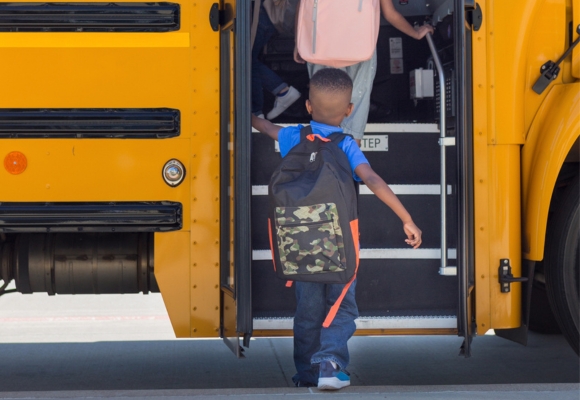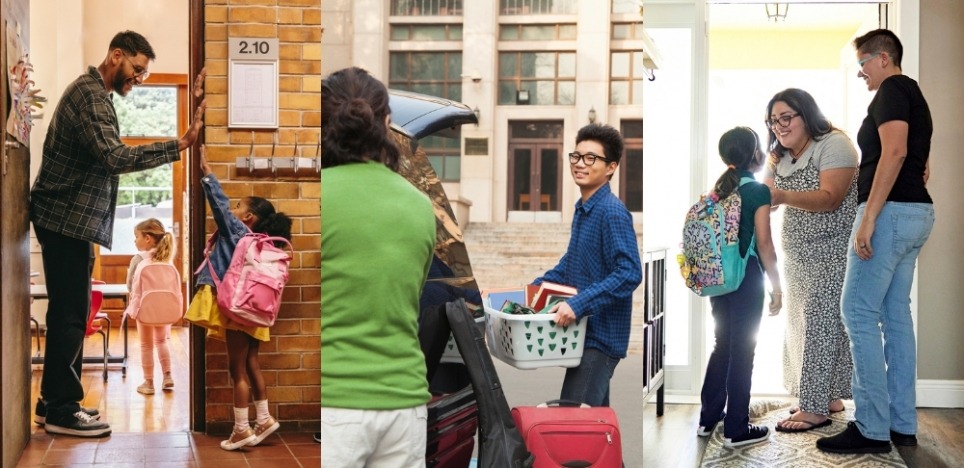Back-to-school might as well be a holiday. Like Christmas, it invites families to consume heavily. Like Rosh Hashanah, it is a season of anticipation. And like Valentine’s day, it can evoke strong and opposite emotions.
There are as many ways to feel about the first day of school as there are students, teachers, and parents preparing for it.
I admit to being a total nerd in my student days. I loved everything about the first day of school: the opportunity to organize and personalize subject binders, the thrill of meeting new teachers, and the return of academic structure to an otherwise too freewheeling social life. I frankly preferred school to summer and class time to recess. I even preferred school days to weekends. Once in kindergarten, I cried when my mom told me it was Saturday.
After a career as a teacher, I feel differently, and have immense empathy for teachers, students, and parents who experience the “new year” as the death of summer and the return of myriad stressors: paperwork, conflicting schedules, homework, grading, and the alarm clock, to name a few.
Whether this time of year feels like a party or a funeral, a new adventure or just another requirement, it is a time of great transition. We may get dragged along by the calendar, gripped by exigencies, and hurried on by the often unnatural pace of academic life.
The following practices are presented to help students, parents, and teachers alike cultivate presence, stillness, and meaning.

Countering Overwhelm & Embracing Stillness
In this season, you may find yourself enmeshed in the same hurry and stress as everyone else in your vicinity (students, family members, school employees, other parents), while also having to fulfill your duties as a caregiver. That’s a load, and you’ll need to cultivate stillness within yourself in order to be present enough to listen to others.
1. To cultivate stillness, try practicing “The Reflective Pause,” which will help you process what is happening and how you feel about it. It can be done in 60 seconds and at any point in your day.
2. When life feels overwhelming, it can also help to take inventory. Use a piece of paper, an email to yourself, or a recording device to list all the to-dos in your head. You can even use small objects to represent each to-do, and compile them on a table or in a jar. Take the abstract thoughts out of your brain (where they can easily link arms with worry and fear) and make them concrete; this can feel like unpacking a bursting suitcase or letting some fresh air into a tight space. Seeing, hearing, and/or touching your list may make the to-dos seem more manageable.

Practices for Listening with Imagination & Heart
Once you have achieved some inner quiet, you will be better prepared for the practice most required of parents and teachers in this season: listening.
1. We invite you to listen to those who come to you as if you are watching a movie or reading a book. Give their story your full attention, make no assumptions, and suspend any disbelief that creeps into your thinking.
2. Generational gaps in experience can make listening especially challenging. When a student expresses a fear or worry, listen without judgment; receive it like a heavy package, even if the concern seems “light” to you. It may help to take some time for self-reflection: what was it like when you were young, insecure, and still learning?
For example, I heard a boy of about 15 telling his friend he was most nervous about “finding his classes.” This felt to me like a pretty light concern — until my judgment-brain relaxed and I recalled my own transition from a one-classroom set-up to the multiple classroom schedules of my junior high and high school campuses. Then I remembered the worries: I will feel so out-of-place if I walk into the wrong classroom and my name isn’t roll-called. I will feel so embarrassed if I get lost and arrive late to class; all eyes will be on me, and the teacher will get upset.
3. In addition to personal reflection, the practice of “Listening Behind” can also help us understand another’s experience. For instance, in the above example, while the boy seems to be talking about ignorance over campus geography, the yearning behind his words may be the desire to belong; the fear behind his words may be that he is not as capable as his classmates. Listening behind can help us identify, connect to, and address emotions, experiences, and values we have in common.

Practices for Remaining Present in Painful Moments
Elizabeth Stone described parenting as a decision “forever to have your heart go walking around outside your body.” The beginning of school, at any age, involves watching your heart disappear down the driveway, onto a school bus, into a classroom, or into a dormitory.
1. Howard Nemerov reflected on this painful leave-taking in “September, The First Day of School,” wishing for his son to find “fathers . . . among his teachers.” Read the poem here and write down a wish that will accompany your child across the threshold.
2. Letting go can occasion worries about how well your child will be taken care of — academically, emotionally, spiritually, and physically. After you watch your child disappear that first day, gather yourself and offer them a benediction as you read aloud “A Prayer for Children Returning to School.”
3. The prevalence of gun violence in places of assembly requires more than prayer, as does the persistence of racism. In his book My Grandmother’s Hands, psychologist Resmaa Menakem addresses “the extra difficulties African Americans have to handle, address, or work around on an ongoing basis. When my completely normal and law-abiding teenage son leaves for school in the morning, I watch him until he gets on the bus, to be sure the police don't confront and harass him.”
Worries this intense require social action and solidarity, but first, as Menakem asserts, they require knowing what we are feeling, where we are feeling it, and becoming settled in our bodies. As a prelude to organizing parents for common sense gun laws, protesting racist policing, or arguing with the school board over banned books, try one of these body awareness practices by Thich Nhat Hanh and Arjuna Ardagh. You can also do these practices with your student each day that they return home safely.

Practices for Countering Hurry & Enriching Time
When time becomes a scarce commodity, personal relationships and meaning can wear thin, ultimately affecting connectedness and mental health.
1. Prevent this “thinness” by being intentional with all of the time you have with your kids. For instance, don’t let the constant transportation turn you into a mere Uber driver: maximize the potential of car time with “Car Talk.”
2. It is important for the whole family to grow together, but getting everyone in the same place at the same time may begin to feel impossible. The first step here is to write everything down! Keep a calendar in a common room or a common app, and record the whole family’s appointments, athletic events, social engagements, work hours, etc. The second step is to find at least one hour a week when the whole family can be together; keep this time sacred and free of media (social or otherwise).
3. Whenever possible, do family time outside so that you and your kids can breathe with trees, wander in open space, and touch surfaces not made by humans. Strategies can be found in this article on “Giving Kids Meaningful Outdoor Play.”
